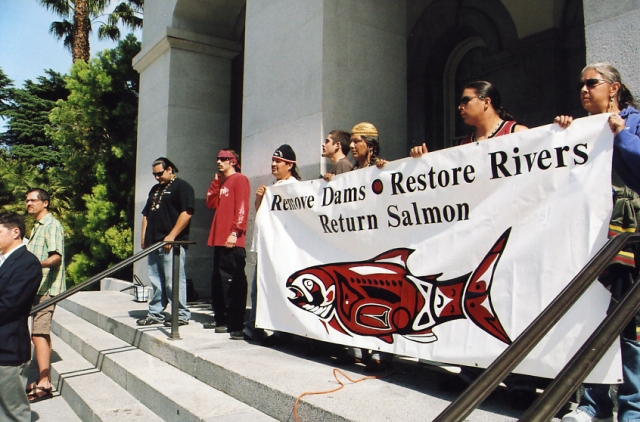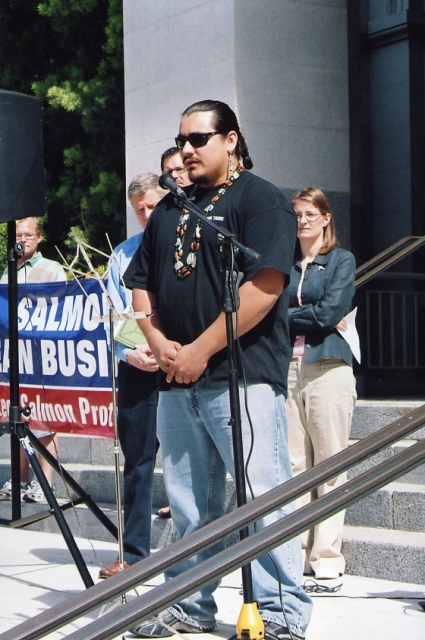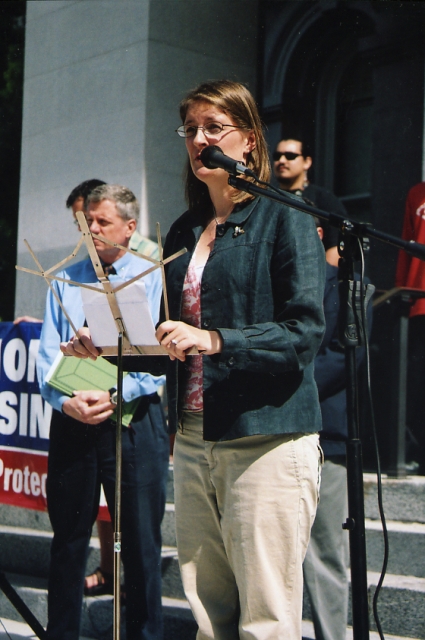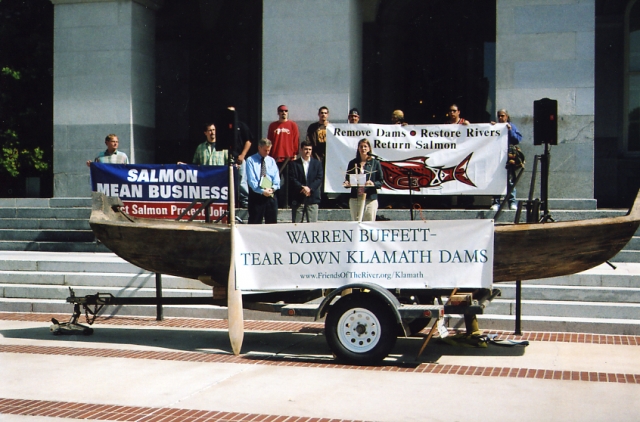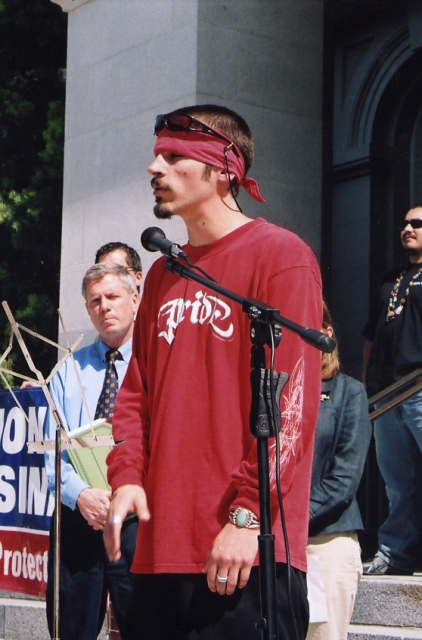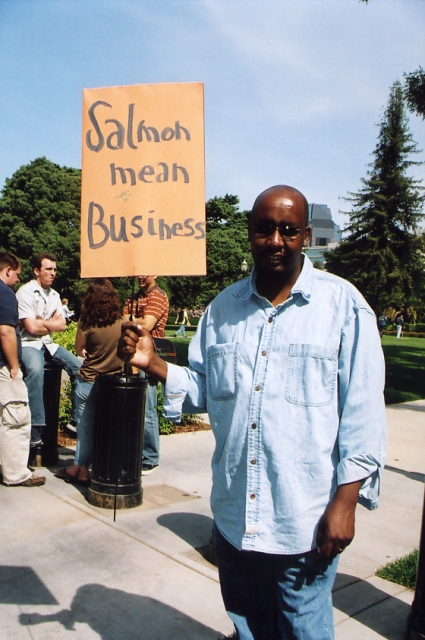From the Open-Publishing Calendar
From the Open-Publishing Newswire
Indybay Feature
Klamath River Tribes stop in Sacramento on pilgrimage to remove PacifiCorp dams
The Klamath River Tribes, fishermen and conservationists arrived in Omaha today on their pilgrimage to remove the dams owned by Warren Buffett. Meanwhile, the Tribes and RFK, Jr. filed a lawsuit today against PacifiCorps's toxic pollution of the Klamath.
Klamath Tribes, Fishermen Go On The Road To Bring Down Dams
by Dan Bacher
Klamath River Indian Tribes, fishermen and their supporters stopped at the State Capitol in Sacramento on Friday, April 27, on their way to Omaha, Nebraska to urge Warren Buffett, the world's second richest man, to “tear down the Klamath dams” to restore Klamath River salmon.
Dam removal advocates want to find out whether Warren Buffett will live up to his highly touted position as the “Oracle of Omaha” or instead serve as a “prophet of doom” for the Klamath River and the California economy.
Members of the Yurok, Karuk and Hoopa Valley Tribes and their allies are arriving in Omaha at the same time Buffett, the CEO of the Berkshire-Hathaway Corporation that owns PacifiCorp's Dams on the Klamath, will meet with his shareholders at the company's annual meeting, nicknamed the “Woodstock of Capitalism,” on May 4-5.
Members of the cross-country caravan are transporting two handcrafted 20-foot long redwood log dugout canoes used in the ceremonies of the Yurok Tribe to Omaha. Four members of the Karuk Tribe, “world renewal” priests (fateveenan) Chook Chook Hillman, Ike Hillman, Cogie McCovey and Codie Donahue, also started on a nine-day fast to “cleanse themselves” and protect them on their journey.
“This is not a dog and pony show; this is a serious thing that we must do to restore the Klamath,” said Chook Chook. “This is more than a fast, but is part of a tradition of denying yourself certain things to achieve a clarity of mind. The Klamath means a lot to us - it is our church, our school, our grocery store and where we traditionally gathered. We need to take the dams down.”
The journey comes at a time when California economy is reeling from the loss of millions of dollars every year because of the steep decline of salmon populations on the Klamath River. The decline results from the cumulative impact of water diversions in the Klamath Basin and poor water quality caused by the algae-laden water that is nurtured behind four dams owned by PacifiCorp.
The Klamath River came to national and international media attention in September 2002 when the largest ever fish kill in U.S. history took place, due to a change in water policy by the Department of Interior that diverted water to agribusiness at the expense of fish. Over 68,000 adult salmon died because of disease spurred by low, warm water conditions - and thousands of juvenile salmon and steelhead have perished from parasite infection in the river every spring since then.
Last year commercial salmon fishermen experienced the most restrictive season in history, since the Klamath and Sacramento River stocks mix together in the ocean and the federal fishing season is based on the weakest stocks. Recreational in-river anglers and Indian tribal fishermen were also devastated last fall by severe fishing restrictions and low numbers of returning fish.
The tribes have been living, fishing and swimming on the Klamath for over 10,000 years. However, recent documentation of toxic algae in the water has convinced many tribal members to avoid body contact with river water. Klamath reservoir water samples by Susan Corum of the Karuk Tribe found toxic microcystis algae concentrations 3,900 times greater than a standard set by the World Health Organization.
Furthermore, a joint release from the federal EPA and California Water Quality Board warned that an adult who ingests just four ounces of water from Klamath reservoirs could be exposed to microcystis at 100 times the standard.
“I grew up swimming in the river, but there is no way I will swim there now because of the toxic algae,” said Codie Donahue. “Dogs have died from drinking the river water.”
The people who are driving on the caravan will be joined by commercial fishermen, conservationists and others who will be flying to Omaha for the stakeholders meeting. They represent a growing coalition of California fishermen, tribes, public health officials and state and federal agencies calling for the “largest dam removal project in U.S. history,” according to Friends of the River.
“The Governors of Oregon and California support dam removal, the Pacific Coast fishing industry supports dam removal, the Klamath tribes support dam removal, environmental organizations support removal, and even PacifiCorp ratepayers support dam removal,” said Peter Ferenbach, executive director of Friends of the River. “Only PacifiCorp chooses to play the role of obstructionist.”
Frankie Myers, a Yurok tribal fisherman and tribal employee who spent many hours counting dead fish during the adult fish kill of September 2002, said the dams represent a dark time in Yurok history.
“When they put in the dams, they put them in under the cover of darkness,” said Myers. “Now, in the relicensing process, we finally have the opportunity to bring the dams down. We're journeying to Omaha to make sure that Warren Buffett hears us so he will do what is right for the Klamath and the communities along the California coast that depend upon its fish. When the dams come down, it will be a good day in our history. We believe that simple economics back up our message.”
The Pacific Coast Federation of Fisherman's Associations (PCFFA) and other commercial fishing organizations are also in strong support of dam removal, as well as national recreational organizations including the American Sportfishing Association (ASA), Water for Fish, Recreational Fishing Alliance (RFA) and Trout Unlimited. Local and regional organizations including the Coastside Fishing Club, United Anglers of California, California Striped Bass Association, California Trout, California Sportfishing Protection Alliance and others also advocate dam removal.
“This type of journey that the tribes are making is the type of thing we need to do more across the board,” said Jim Martin, West Coast Director of RFA. “We absolutely support the tribes and commercial fishermen in their battle to bring down the dams.”
Mike Hudson, president of the Small Boat Commercial Salmon Fishermen's Association, commented on the terrible impact of the dams on the salmon fishing industry. “Our communities, our jobs and our families are being devastated by PacifiCorp's dams. Last year I caught 10 percent of the salmon that I had taken in previous seasons, even with already strict regulations. Other fishermen I talked to also reported similarly poor fishing,” he said.
He cited how 101 years ago, JB Lippencott, Supervising Engineer for the Reclamation Service (now called the Bureau of Reclamation) forecasted the destruction the dams would cause:
“It can be predicted that the construction of additional impoundments on the Klamath River will greatly increase the organic loads of this already impossibly burdened stream and will probably bring an end to fish production in this stream.”
This is not the first time that the tribes, fishermen and conservationists have traveled far to convince PacifiCorp's owners that the dams need to be removed. During the summers of 2004 and 2005, they traveled all of the way to Edinburgh, Scotland in an attempt to convince the shareholders of Scottish Power, the former owner of PacifiCorp, to back dam removal.
Warren Buffett's Berkshire Hathaway Company purchased Scottish Power in 2006 and has resisted dam removal since then, in spite of substantial evidence that dam removal would be more economically feasible than constructing fish ladders.
After reviewing data from a 50-page filing submitted by PacifiCorp to the Federal Energy Regulatory Commission (FERC), the California Energy Commission in March issued a groundbreaking report showing that it makes more economic sense than first thought to remove the four dams and buy replacement power.
“The report showed that removing the dams is the preferable approach, based on the savings to PacifiCorp's ratepayers,” said Terry O'Brien, a Deputy Director of the California Energy Commission. “According to PacifiCorp's own data, removing the dams would be about $114,000,000 less costly over a 30 year period than reclicensing the project and installing fish ladders.”
Although Pacific Corp has tried to spin the issue of dam removal by claiming that its hydroelectricity is “green power,” O'Brien emphasized that buying clean energy from other sources would be not only less expensive, but much less environmentally destructive to fish and people dependent on the Klamath River.
“Dam removal is a win-win situation for everybody,” said O'Brien. “Not only will the ratepayers benefit economically, but the benefits to the fishing industry of northern California and Oregon and water quality will be immense.”
The Klamath River is one of the most important rivers for threatened populations of chinook and coho salmon and steelhead trout on the West Coast. The river also hosts annual migrations of Pacific lamprey, green sturgeon and American shad.
Meanwhile, Zeke Grader, executive director of the PCFFA, said he will be talking to Congressional Representatives regarding bringing down the dams and restoring the Klamath.
“I'm really worried that this is such a low rainfall year on the Klamath,” stated Grader. “We have almost the same runoff conditions that we had in 2002, when the big juvenile and adult fish kills took place, and the federal and state agencies have no contingency plans in place.”
Press Release from Klamath Riverkeeper and Tribes:
Tribal Leaders, Fishermen and Business Owners Sue PacifiCorp Over Klamath River Toxins
RFK Jr. and Joseph W. Cotchett are filing the lawsuit on behalf of the Waterkeeper Alliance, Klamath River Tribes, Fishermen and Business Owners.
NEWS RELEASE NEWS RELEASE NEWS RELEASE
For immediate release Wednesday, May 2, 2007
Tribal Leaders, Fishermen and Business Owners Sue PacifiCorp Over Klamath River Toxins
Attys Kennedy and Cotchett file suit
SAN FRANCISCO – A group of Klamath River tribal leaders, commercial fishermen and recreational business owners filed suit today against PacifiCorp, contending that two of its dams in Northern California are the cause of massive blooms of toxic algae that are decimating the salmon fishery and causing an extreme potential health hazard to humans.
The group retained nationally-known trial lawyers to file the suit in the United States District Court in San Francisco, which has jurisdiction over all of Northern California.
"These dams are having a devastating impact on the economies and cultures of Native Americans and others who depend on the Klamath River," said Robert F. Kennedy Jr., of Kennedy & Madonna of Hurley, New York, co-counsel in the case who has successfully represented Riverkeeper of New York in fighting pollution in the Hudson River and Long Island Sound.
Kennedy also serves as senior attorney for the Natural Resources Defense Council and as President of the Waterkeeper Alliance based in Irvington, New York.
One of the main claims of the suit is that the "ceremonies and substance fishing for Yurok and Karuk tribes are under siege because of the deadly toxins created by PacifiCorp’s dams," said Joseph W. Cotchett of Cotchett, Pitre & McCarthy of Burlingame, California, Kennedy’s co-counsel and recognized nationally for his firm’s representation of socially just causes.
The lawsuit contends the reservoirs behind the Iron Gate and Copco dams in Northern California near the Oregon border are a toxic nuisance and that Portland-based PacifiCorp should be enjoined from operating them in a way that causes the annual toxic blooms because of improper intake and release of water. "PacifiCorp’s operation of the dams raises water temperatures in the reservoirs well above natural levels" resulting in the algae’s growth "so much so that a layer of toxic scum now covers the reservoirs from July through October," the suit said.
The suit was filed on behalf of Yurok and Karuk tribal leaders, commercial salmon fishermen, river recreation business owners and the Klamath Riverkeeper group.
The suit said that for at least the last six years, PacifiCorp has been aware of the toxic algae blooms but has failed to correct the situation. According to co-counsel Daniel G. Cooper of Lawyers for Clean Water Inc. of San Francisco, "the algae’s effects go far beyond the annual toxic blooms – it poses a threat to the fishery and human health, because it generates a potent liver toxin and tumor promoter known as a microcystin."
Regina Chichizola of the Klamath Riverkeeper said the dams "are creating and releasing toxic algae in concentrations 4,000 times what is safe for contact according to the World Health Organization. For the local tribes and many business owners, these dams are robbing river and coastal communities of their livelihoods and causing potential health problems for the local population."
One of the plaintiffs is Michael T. Hudson, a Berkeley resident who fishes out of Half Moon Bay and is president of the Small Boat Commercial Salmon Fishermen’s Association. He called the situation "a major environmental emergency, as evidenced by the fact that just last year low returns of Klamath salmon prompted fisheries’ managers to ban nearly all commercial salmon fishing along 700 miles of coastline from Monterey Bay to Coos Bay, Oregon."
PacifiCorp, whose hydroelectric operations provide power to customers in Oregon and California, was acquired by MidAmerican Energy in 2006. MidAmerican is controlled, in turn, by Warren Buffett’s Berkshire Hathaway investment group. See attached U.S. Department of Interior map showing the location of the two dams.
According to plaintiff Leaf Hillman, a ceremonial leader from the Karuk Tribe, tribal members and fishermen transported two Native American dugout canoes to Omaha where Berkshire Hathaway shareholders are meeting May 4-5. "We hope to talk to the shareholders and gain the company’s and Warren Buffett’s support to do the right thing and correct the situation," Hillman said. "Warren Buffett is a decent man who will understand our plight and as the new owner of the dam, we ask that he consider our petition."
CONTACTS:
Morrow Cater, Klamath media coordinator, (415) 453-0430
Don Thornton (650) 697-6000 (Cotchett, Pitre & McCarthy)
Robert F. Kennedy Jr. (845) 331-7514 (Kennedy & Madonna)
Regina Chichizola (541) 951-0126 (Klamath Riverkeeper)
Daniel G. Cooper (310) 829 1229 X224 (Lawyers for Clean Water)
Electronic copies of complaint available, Don Thornton (650) 697-6000
by Dan Bacher
Klamath River Indian Tribes, fishermen and their supporters stopped at the State Capitol in Sacramento on Friday, April 27, on their way to Omaha, Nebraska to urge Warren Buffett, the world's second richest man, to “tear down the Klamath dams” to restore Klamath River salmon.
Dam removal advocates want to find out whether Warren Buffett will live up to his highly touted position as the “Oracle of Omaha” or instead serve as a “prophet of doom” for the Klamath River and the California economy.
Members of the Yurok, Karuk and Hoopa Valley Tribes and their allies are arriving in Omaha at the same time Buffett, the CEO of the Berkshire-Hathaway Corporation that owns PacifiCorp's Dams on the Klamath, will meet with his shareholders at the company's annual meeting, nicknamed the “Woodstock of Capitalism,” on May 4-5.
Members of the cross-country caravan are transporting two handcrafted 20-foot long redwood log dugout canoes used in the ceremonies of the Yurok Tribe to Omaha. Four members of the Karuk Tribe, “world renewal” priests (fateveenan) Chook Chook Hillman, Ike Hillman, Cogie McCovey and Codie Donahue, also started on a nine-day fast to “cleanse themselves” and protect them on their journey.
“This is not a dog and pony show; this is a serious thing that we must do to restore the Klamath,” said Chook Chook. “This is more than a fast, but is part of a tradition of denying yourself certain things to achieve a clarity of mind. The Klamath means a lot to us - it is our church, our school, our grocery store and where we traditionally gathered. We need to take the dams down.”
The journey comes at a time when California economy is reeling from the loss of millions of dollars every year because of the steep decline of salmon populations on the Klamath River. The decline results from the cumulative impact of water diversions in the Klamath Basin and poor water quality caused by the algae-laden water that is nurtured behind four dams owned by PacifiCorp.
The Klamath River came to national and international media attention in September 2002 when the largest ever fish kill in U.S. history took place, due to a change in water policy by the Department of Interior that diverted water to agribusiness at the expense of fish. Over 68,000 adult salmon died because of disease spurred by low, warm water conditions - and thousands of juvenile salmon and steelhead have perished from parasite infection in the river every spring since then.
Last year commercial salmon fishermen experienced the most restrictive season in history, since the Klamath and Sacramento River stocks mix together in the ocean and the federal fishing season is based on the weakest stocks. Recreational in-river anglers and Indian tribal fishermen were also devastated last fall by severe fishing restrictions and low numbers of returning fish.
The tribes have been living, fishing and swimming on the Klamath for over 10,000 years. However, recent documentation of toxic algae in the water has convinced many tribal members to avoid body contact with river water. Klamath reservoir water samples by Susan Corum of the Karuk Tribe found toxic microcystis algae concentrations 3,900 times greater than a standard set by the World Health Organization.
Furthermore, a joint release from the federal EPA and California Water Quality Board warned that an adult who ingests just four ounces of water from Klamath reservoirs could be exposed to microcystis at 100 times the standard.
“I grew up swimming in the river, but there is no way I will swim there now because of the toxic algae,” said Codie Donahue. “Dogs have died from drinking the river water.”
The people who are driving on the caravan will be joined by commercial fishermen, conservationists and others who will be flying to Omaha for the stakeholders meeting. They represent a growing coalition of California fishermen, tribes, public health officials and state and federal agencies calling for the “largest dam removal project in U.S. history,” according to Friends of the River.
“The Governors of Oregon and California support dam removal, the Pacific Coast fishing industry supports dam removal, the Klamath tribes support dam removal, environmental organizations support removal, and even PacifiCorp ratepayers support dam removal,” said Peter Ferenbach, executive director of Friends of the River. “Only PacifiCorp chooses to play the role of obstructionist.”
Frankie Myers, a Yurok tribal fisherman and tribal employee who spent many hours counting dead fish during the adult fish kill of September 2002, said the dams represent a dark time in Yurok history.
“When they put in the dams, they put them in under the cover of darkness,” said Myers. “Now, in the relicensing process, we finally have the opportunity to bring the dams down. We're journeying to Omaha to make sure that Warren Buffett hears us so he will do what is right for the Klamath and the communities along the California coast that depend upon its fish. When the dams come down, it will be a good day in our history. We believe that simple economics back up our message.”
The Pacific Coast Federation of Fisherman's Associations (PCFFA) and other commercial fishing organizations are also in strong support of dam removal, as well as national recreational organizations including the American Sportfishing Association (ASA), Water for Fish, Recreational Fishing Alliance (RFA) and Trout Unlimited. Local and regional organizations including the Coastside Fishing Club, United Anglers of California, California Striped Bass Association, California Trout, California Sportfishing Protection Alliance and others also advocate dam removal.
“This type of journey that the tribes are making is the type of thing we need to do more across the board,” said Jim Martin, West Coast Director of RFA. “We absolutely support the tribes and commercial fishermen in their battle to bring down the dams.”
Mike Hudson, president of the Small Boat Commercial Salmon Fishermen's Association, commented on the terrible impact of the dams on the salmon fishing industry. “Our communities, our jobs and our families are being devastated by PacifiCorp's dams. Last year I caught 10 percent of the salmon that I had taken in previous seasons, even with already strict regulations. Other fishermen I talked to also reported similarly poor fishing,” he said.
He cited how 101 years ago, JB Lippencott, Supervising Engineer for the Reclamation Service (now called the Bureau of Reclamation) forecasted the destruction the dams would cause:
“It can be predicted that the construction of additional impoundments on the Klamath River will greatly increase the organic loads of this already impossibly burdened stream and will probably bring an end to fish production in this stream.”
This is not the first time that the tribes, fishermen and conservationists have traveled far to convince PacifiCorp's owners that the dams need to be removed. During the summers of 2004 and 2005, they traveled all of the way to Edinburgh, Scotland in an attempt to convince the shareholders of Scottish Power, the former owner of PacifiCorp, to back dam removal.
Warren Buffett's Berkshire Hathaway Company purchased Scottish Power in 2006 and has resisted dam removal since then, in spite of substantial evidence that dam removal would be more economically feasible than constructing fish ladders.
After reviewing data from a 50-page filing submitted by PacifiCorp to the Federal Energy Regulatory Commission (FERC), the California Energy Commission in March issued a groundbreaking report showing that it makes more economic sense than first thought to remove the four dams and buy replacement power.
“The report showed that removing the dams is the preferable approach, based on the savings to PacifiCorp's ratepayers,” said Terry O'Brien, a Deputy Director of the California Energy Commission. “According to PacifiCorp's own data, removing the dams would be about $114,000,000 less costly over a 30 year period than reclicensing the project and installing fish ladders.”
Although Pacific Corp has tried to spin the issue of dam removal by claiming that its hydroelectricity is “green power,” O'Brien emphasized that buying clean energy from other sources would be not only less expensive, but much less environmentally destructive to fish and people dependent on the Klamath River.
“Dam removal is a win-win situation for everybody,” said O'Brien. “Not only will the ratepayers benefit economically, but the benefits to the fishing industry of northern California and Oregon and water quality will be immense.”
The Klamath River is one of the most important rivers for threatened populations of chinook and coho salmon and steelhead trout on the West Coast. The river also hosts annual migrations of Pacific lamprey, green sturgeon and American shad.
Meanwhile, Zeke Grader, executive director of the PCFFA, said he will be talking to Congressional Representatives regarding bringing down the dams and restoring the Klamath.
“I'm really worried that this is such a low rainfall year on the Klamath,” stated Grader. “We have almost the same runoff conditions that we had in 2002, when the big juvenile and adult fish kills took place, and the federal and state agencies have no contingency plans in place.”
Press Release from Klamath Riverkeeper and Tribes:
Tribal Leaders, Fishermen and Business Owners Sue PacifiCorp Over Klamath River Toxins
RFK Jr. and Joseph W. Cotchett are filing the lawsuit on behalf of the Waterkeeper Alliance, Klamath River Tribes, Fishermen and Business Owners.
NEWS RELEASE NEWS RELEASE NEWS RELEASE
For immediate release Wednesday, May 2, 2007
Tribal Leaders, Fishermen and Business Owners Sue PacifiCorp Over Klamath River Toxins
Attys Kennedy and Cotchett file suit
SAN FRANCISCO – A group of Klamath River tribal leaders, commercial fishermen and recreational business owners filed suit today against PacifiCorp, contending that two of its dams in Northern California are the cause of massive blooms of toxic algae that are decimating the salmon fishery and causing an extreme potential health hazard to humans.
The group retained nationally-known trial lawyers to file the suit in the United States District Court in San Francisco, which has jurisdiction over all of Northern California.
"These dams are having a devastating impact on the economies and cultures of Native Americans and others who depend on the Klamath River," said Robert F. Kennedy Jr., of Kennedy & Madonna of Hurley, New York, co-counsel in the case who has successfully represented Riverkeeper of New York in fighting pollution in the Hudson River and Long Island Sound.
Kennedy also serves as senior attorney for the Natural Resources Defense Council and as President of the Waterkeeper Alliance based in Irvington, New York.
One of the main claims of the suit is that the "ceremonies and substance fishing for Yurok and Karuk tribes are under siege because of the deadly toxins created by PacifiCorp’s dams," said Joseph W. Cotchett of Cotchett, Pitre & McCarthy of Burlingame, California, Kennedy’s co-counsel and recognized nationally for his firm’s representation of socially just causes.
The lawsuit contends the reservoirs behind the Iron Gate and Copco dams in Northern California near the Oregon border are a toxic nuisance and that Portland-based PacifiCorp should be enjoined from operating them in a way that causes the annual toxic blooms because of improper intake and release of water. "PacifiCorp’s operation of the dams raises water temperatures in the reservoirs well above natural levels" resulting in the algae’s growth "so much so that a layer of toxic scum now covers the reservoirs from July through October," the suit said.
The suit was filed on behalf of Yurok and Karuk tribal leaders, commercial salmon fishermen, river recreation business owners and the Klamath Riverkeeper group.
The suit said that for at least the last six years, PacifiCorp has been aware of the toxic algae blooms but has failed to correct the situation. According to co-counsel Daniel G. Cooper of Lawyers for Clean Water Inc. of San Francisco, "the algae’s effects go far beyond the annual toxic blooms – it poses a threat to the fishery and human health, because it generates a potent liver toxin and tumor promoter known as a microcystin."
Regina Chichizola of the Klamath Riverkeeper said the dams "are creating and releasing toxic algae in concentrations 4,000 times what is safe for contact according to the World Health Organization. For the local tribes and many business owners, these dams are robbing river and coastal communities of their livelihoods and causing potential health problems for the local population."
One of the plaintiffs is Michael T. Hudson, a Berkeley resident who fishes out of Half Moon Bay and is president of the Small Boat Commercial Salmon Fishermen’s Association. He called the situation "a major environmental emergency, as evidenced by the fact that just last year low returns of Klamath salmon prompted fisheries’ managers to ban nearly all commercial salmon fishing along 700 miles of coastline from Monterey Bay to Coos Bay, Oregon."
PacifiCorp, whose hydroelectric operations provide power to customers in Oregon and California, was acquired by MidAmerican Energy in 2006. MidAmerican is controlled, in turn, by Warren Buffett’s Berkshire Hathaway investment group. See attached U.S. Department of Interior map showing the location of the two dams.
According to plaintiff Leaf Hillman, a ceremonial leader from the Karuk Tribe, tribal members and fishermen transported two Native American dugout canoes to Omaha where Berkshire Hathaway shareholders are meeting May 4-5. "We hope to talk to the shareholders and gain the company’s and Warren Buffett’s support to do the right thing and correct the situation," Hillman said. "Warren Buffett is a decent man who will understand our plight and as the new owner of the dam, we ask that he consider our petition."
CONTACTS:
Morrow Cater, Klamath media coordinator, (415) 453-0430
Don Thornton (650) 697-6000 (Cotchett, Pitre & McCarthy)
Robert F. Kennedy Jr. (845) 331-7514 (Kennedy & Madonna)
Regina Chichizola (541) 951-0126 (Klamath Riverkeeper)
Daniel G. Cooper (310) 829 1229 X224 (Lawyers for Clean Water)
Electronic copies of complaint available, Don Thornton (650) 697-6000
Add Your Comments
We are 100% volunteer and depend on your participation to sustain our efforts!
Get Involved
If you'd like to help with maintaining or developing the website, contact us.
Publish
Publish your stories and upcoming events on Indybay.
Topics
More
Search Indybay's Archives
Advanced Search
►
▼
IMC Network


